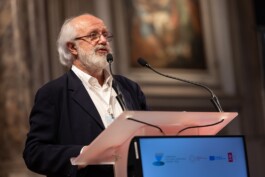


2 October 2023
One of the great pleasures of a musician and especially of a singer is that of finding the music underlying languages and we in Europe are spoiled to have so many in such a limited geographical space. .

When I was offered the honour of participating in this Agora, I accepted and immediately came to the idea that this word UTOPIA had something paradoxical since it refers to a non-place – u-topos and having been, since my youth, inspired by the work of the great humanist Thomas More, I was interested in what he says in his preface to the Basel edition of his work. "Eutopia merita sum vocanda nomine"
So, if you allow me, I will add the letter [e] which, in English, often sounds [e] and [i], to somehow prove to you that this place of Good is possible.
European cultural heritage will be a fundamental actor for this transition from Utopia to Eutopia and notice how the EU also appears with all its symbolic force…
Let's put first the e of Ear!
We all know, and scientifically proven, that hearing is the first sense to be developed in the human foetus and that today is the most forgotten and least developed sense of our intelligence. Let's relearn to listen and hear and for that music is a wonderful tool for development.
It will also permit us, with open ears, to practice empathy, another word with an e. And when we talk about empathy we are talking about emotions and emotional intelligence, an aspect often forgotten by our contemporaries and recovered today by ideologies where the dirty work is to awaken the vilest of them, such as fear and hatred.
And here again Music can be a privileged instrument because it has this incredible quality of bringing together body, heart and mind, in an operative and balanced triad.
Hence its importance for this key word of our goal: education. It is by introducing the “homo artisticus” hand in hand with “homo economicus”, the true emperor of the many decades that preceded us and by introducing creativity as a profoundly human and essential capacity, thus emerging from the producer/consumer dichotomy to which they constantly condemn our contemporaries, that we will be able to build a more just and creative society. And the educational tool of musical practice can be, also, a powerful lesson of democracy constructing a real citizenship.
Thus with the Enlightenment of an intelligence not artificial, no, but profoundly human, also playing with the designation so well found of ancestral intelligence, that we can be truly efficient to build an open culture to all and not only to happy few “initiés” or people with sufficient purchasing power to benefit from it in a confined space of pure entertainment. As Jordi Pascual said yesterday the right for culture is a Human Right of the UN Declaration.
Music once again is here to tell us, thanks to its many virtues, how throughout the centuries and I dare say since the dawn of time, has proved to us the strength of hybridity, métissage, the mixing that is the European cultural identity and, particularly, in the history of Music, as it was practiced in Europe.
In 822 arrived in Cordoba, Spain, one of the most eminent musicians of the Islamic world: Ziryab! Thanks to him Europe will have its first music school and a new musical form will be created by this polymath figure, a kind of Leonardo da Vinci of the middle age, named “Nuba”. And what is a nuba? The result of the mix of Arabo-Persian tradition, Hebrew tradition and Christian one.
Ecumenism is the key to a rich musical dialogue, exemplary not only by the collaboration between the three Abrahamic religions but also, and this is very important, with a very significant role of the Women not only as musicians, singers, dancers but also composers and poetesses. This exemplarity must be a reference in our times where the fanatisms and fundamentalisms are growing dangerously. That’s why, one of the aims of the CEM Spain will be of placing again, for the future generations, the example of Ziryab and of Al-Andalus in the recognition of this long period of cohabitation of the three religions and cultures that forged the European culture permitting the advent of the Renaissance Humanism.
And how not to be sensitive to the fact that Music has always had a relationship of inspiration and respect with Nature, so it has always been ecological and today, scientifically, we arrive with the CEM and its Scientific Council in an amazing transdisciplinary spirit to work with the help of sound and music with 14 different disciplines from astrophysics to philosophy, from linguistics to quantic physics, from history to biology, from anthropology to oceanography, on objects as distant as underwater biodiversity, bird migrations, the language of plants, or the song of whales or dolphins. The list would be long to be able to talk to you about everything we develop but, also, in our Music-Brain Hub on all the benefits of Music for brain plasticity, memory, concentration, therapy of diseases such as Alzheimer's, Parkinson's, autistic syndrome behaviours to speak only of some.
And it is in the exaltation that provides the enthusiasm of a life dedicated to Music, with the experience of having developed musical programs in theatres of war, as in the Middle East, of having established programs in Palestinian camps and now of carrying this pan-European CEM project with partnerships with 144 organizations from 56 countries, especially African, Latin American, Near and Middle Eastern where each time Music becomes the soul of human and creative exchanges, I affirm to you: we can do it!
but political and economic actors must be in euphony with the world of culture which, as UNESCO recognizes, is the fourth pillar of sustainable development.
So Utopia, no! Eutopia, YES!
And for it to be done, let's all put us in protopia
Alla Bellissima, Serenissima ed Europanissima Venezia la mia gratitudine
A Europa Nostra, il mio sangue e lavoro
A voi tutti la Musica!
Thank you
Jorge Chaminé
September 29th 2023
European Cultural Heritage Summit 2023 in Venice
Scuola San Giovanni Evangelista
Venezia
2 October 2023
One of the great pleasures of a musician and especially of a singer is that of finding the music underlying languages and we in Europe are spoiled to have so many in such a limited geographical space. .

When I was offered the honour of participating in this Agora, I accepted and immediately came to the idea that this word UTOPIA had something paradoxical since it refers to a non-place – u-topos and having been, since my youth, inspired by the work of the great humanist Thomas More, I was interested in what he says in his preface to the Basel edition of his work. "Eutopia merita sum vocanda nomine"
So, if you allow me, I will add the letter [e] which, in English, often sounds [e] and [i], to somehow prove to you that this place of Good is possible.
European cultural heritage will be a fundamental actor for this transition from Utopia to Eutopia and notice how the EU also appears with all its symbolic force…
Let's put first the e of Ear!
We all know, and scientifically proven, that hearing is the first sense to be developed in the human foetus and that today is the most forgotten and least developed sense of our intelligence. Let's relearn to listen and hear and for that music is a wonderful tool for development.
It will also permit us, with open ears, to practice empathy, another word with an e. And when we talk about empathy we are talking about emotions and emotional intelligence, an aspect often forgotten by our contemporaries and recovered today by ideologies where the dirty work is to awaken the vilest of them, such as fear and hatred.
And here again Music can be a privileged instrument because it has this incredible quality of bringing together body, heart and mind, in an operative and balanced triad.
Hence its importance for this key word of our goal: education. It is by introducing the “homo artisticus” hand in hand with “homo economicus”, the true emperor of the many decades that preceded us and by introducing creativity as a profoundly human and essential capacity, thus emerging from the producer/consumer dichotomy to which they constantly condemn our contemporaries, that we will be able to build a more just and creative society. And the educational tool of musical practice can be, also, a powerful lesson of democracy constructing a real citizenship.
Thus with the Enlightenment of an intelligence not artificial, no, but profoundly human, also playing with the designation so well found of ancestral intelligence, that we can be truly efficient to build an open culture to all and not only to happy few “initiés” or people with sufficient purchasing power to benefit from it in a confined space of pure entertainment. As Jordi Pascual said yesterday the right for culture is a Human Right of the UN Declaration.
Music once again is here to tell us, thanks to its many virtues, how throughout the centuries and I dare say since the dawn of time, has proved to us the strength of hybridity, métissage, the mixing that is the European cultural identity and, particularly, in the history of Music, as it was practiced in Europe.
In 822 arrived in Cordoba, Spain, one of the most eminent musicians of the Islamic world: Ziryab! Thanks to him Europe will have its first music school and a new musical form will be created by this polymath figure, a kind of Leonardo da Vinci of the middle age, named “Nuba”. And what is a nuba? The result of the mix of Arabo-Persian tradition, Hebrew tradition and Christian one.
Ecumenism is the key to a rich musical dialogue, exemplary not only by the collaboration between the three Abrahamic religions but also, and this is very important, with a very significant role of the Women not only as musicians, singers, dancers but also composers and poetesses. This exemplarity must be a reference in our times where the fanatisms and fundamentalisms are growing dangerously. That’s why, one of the aims of the CEM Spain will be of placing again, for the future generations, the example of Ziryab and of Al-Andalus in the recognition of this long period of cohabitation of the three religions and cultures that forged the European culture permitting the advent of the Renaissance Humanism.
And how not to be sensitive to the fact that Music has always had a relationship of inspiration and respect with Nature, so it has always been ecological and today, scientifically, we arrive with the CEM and its Scientific Council in an amazing transdisciplinary spirit to work with the help of sound and music with 14 different disciplines from astrophysics to philosophy, from linguistics to quantic physics, from history to biology, from anthropology to oceanography, on objects as distant as underwater biodiversity, bird migrations, the language of plants, or the song of whales or dolphins. The list would be long to be able to talk to you about everything we develop but, also, in our Music-Brain Hub on all the benefits of Music for brain plasticity, memory, concentration, therapy of diseases such as Alzheimer's, Parkinson's, autistic syndrome behaviours to speak only of some.
And it is in the exaltation that provides the enthusiasm of a life dedicated to Music, with the experience of having developed musical programs in theatres of war, as in the Middle East, of having established programs in Palestinian camps and now of carrying this pan-European CEM project with partnerships with 144 organizations from 56 countries, especially African, Latin American, Near and Middle Eastern where each time Music becomes the soul of human and creative exchanges, I affirm to you: we can do it!
but political and economic actors must be in euphony with the world of culture which, as UNESCO recognizes, is the fourth pillar of sustainable development.
So Utopia, no! Eutopia, YES!
And for it to be done, let's all put us in protopia
Alla Bellissima, Serenissima ed Europanissima Venezia la mia gratitudine
A Europa Nostra, il mio sangue e lavoro
A voi tutti la Musica!
Thank you
Jorge Chaminé
September 29th 2023
European Cultural Heritage Summit 2023 in Venice
Scuola San Giovanni Evangelista
Venezia


Playlist